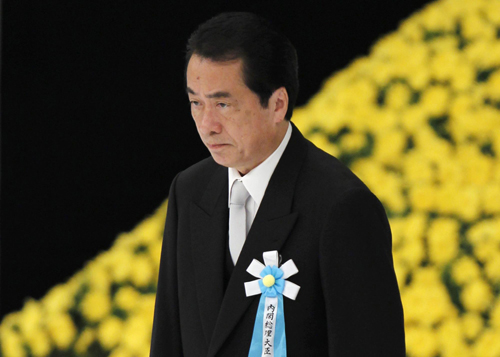Asia-Pacific
Japanese PM apologizes on anniversary of WWII end
(Agencies)
Updated: 2010-08-15 14:09
 |
Large Medium Small |
TOKYO – Japan's new liberal prime minister shunned a visit to a shrine that has outraged Asian neighbors for honoring war criminals, breaking from past governments' tradition and instead apologizing Sunday for the suffering World War II caused.
Members of the now-opposition Liberal Democratic Party, which ruled Japan nearly continuously since the end of the war, made a point by carrying out their own trip to Yasukuni Shrine in Tokyo on the 65th anniversary of the end of World War II.
The Shinto shrine — a spectacular building with sweeping roofs and a museum in its grounds that glorifies kamikaze pilots — has set off controversy by honoring the 2.5 million Japanese war dead, including Class A war criminals such as Hideki Tojo, Japan's war-time prime minister who was executed in 1948.
Among those who visited Yasukuni was LDP leader Sadakazu Tanigaki and former Prime Minister Shintaro Abe. About 40 legislators went to the shrine, but none from Prime Minister Naoto Kan's Cabinet, according to Japanese media reports.
Kan leads the Democratic Party, which took power last after winning elections on promises of greater transparency and grass-roots democracy. It is the first time since the end of World War II that the entire Japanese Cabinet has avoided visiting Yasukuni on Aug. 15, the day Japan surrendered in the war.
"We caused great damage and suffering to many nations during the war, especially to the people of Asia," Kan told a crowd of about 6,000 at an annual memorial service for the war dead at Budokan hall in Tokyo.
"We feel a deep regret, and we offer our sincere feelings of condolence to those who suffered and their families," he said. "We renew our promise to never wage war, and we promise to do our utmost to achieve eternal world peace and to never repeat again the mistake of war."
Among those listening to Kan's words were Emperor Akihito, whose father Hirohito announced the surrender 65 years ago in a radio broadcast — the first time the Japanese public had heard the real voice of the emperor, who had been revered as a living god to justify imperial expansion.
Akihito, who has never visited Yasukuni, led a moment of silence at noon, bowing deeply before a stage filled with yellow and white chrysanthemums.
The families and friends of more than 3 million Japanese who died in war, including a gray-haired woman in a wheelchair clutching a black-and-white photo of a soldier, bowed their heads in silence for a minute.
Japanese media reports identified the woman as Chiyoka Takakura, 96, whose husband died in the Philippines.
"I feel once again a deep sadness for those many who lost their precious lives and for their families," Akihito said, attending the ceremony with his wife Michiko. "I pray for the continued prosperity of our nation and for world peace."
Tomoaki Iwai, a professor of politics at Nihon University, said Kan's shunning the Yasukuni visit underlined the Democrats' liberal-leaning pacifist policies.
"His decision is in line with what would be expected of the Democrats," he said.
Kan also paid respect at a far less controversial memorial for the war dead, laying a bouquet before a grave for Japanese soldiers.
Last week, he apologized to South Korea for its 1910-45 colonial rule. Imperialist Japan committed atrocities in Asia, including forcing Koreans to fight as front-line soldiers, work in slave-labor conditions and serve as prostitutes in military-run brothels.
In Seoul, South Korean President Lee Myung-bak, speaking Sunday before a crowd packing a plaza near the former royal palace, said history should not be forgotten but urged Japan and his nation to work together for a new future.
"I have taken note of Japan's effort, which represents one step forward," Lee said of Kan's apology.
